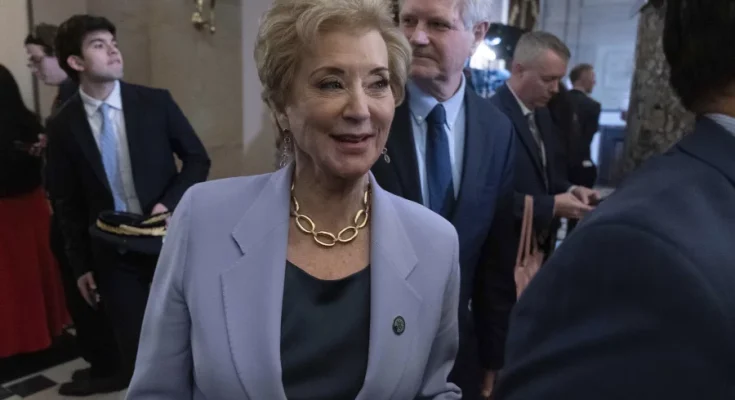President Trump is expected to issue an executive action as early as Thursday calling on Education Secretary Linda McMahon to “take all necessary steps to facilitate the closure of the Department of Education,” according to a draft of the action obtained by NPR.
The move has been expected since early February, when the White House revealed its intentions but withheld the action itself until after McMahon’s Senate confirmation.
The Senate voted Monday to make McMahon the next education secretary. Democrats uniformly opposed her after McMahon publicly committed to unwinding the department.
The draft action instructs McMahon to act “to the maximum extent appropriate and permitted by law,” an acknowledgement that the department and its signature responsibilities were created by Congress, are protected by statute and cannot legally be altered without congressional approval, which would almost certainly require 60 votes to overcome a Democratic filibuster.
News of the action was first reported by The Wall Street Journal.
The White House did not respond to a request for comment.
The order offers as justification for the department’s closure that “since its founding in 1979, the Department of Education has spent more than $1 trillion without producing virtually any improvement in student reading and mathematics scores.”
According to The Nation’s Report Card, one of the oldest and most reliable barometers of student achievement in the U.S., reading scores changed little between 1992 and 2019, though math achievement improved considerably. The pandemic, though, wrought havoc on student achievement, with many learning gaps remaining nearly five years after schools first closed.
The draft executive action declares “the experiment of controlling American education through Federal programs and dollars … has failed our children.”
On average, federal dollars make up roughly 10% of public schools’ funding, the lion’s share coming from states and local taxes. Those federal dollars are also largely targeted to help the nation’s most vulnerable students: those living in low-income communities, including millions of rural students, and children with disabilities. The department is prohibited by law from telling schools what, or how, to teach.
Within hours of McMahon’s confirmation Monday, she shared a lengthy message with Education Department staff attempting to rally support for the department’s unwinding, calling it “our opportunity to perform one final, unforgettable public service to future generations of students.”





